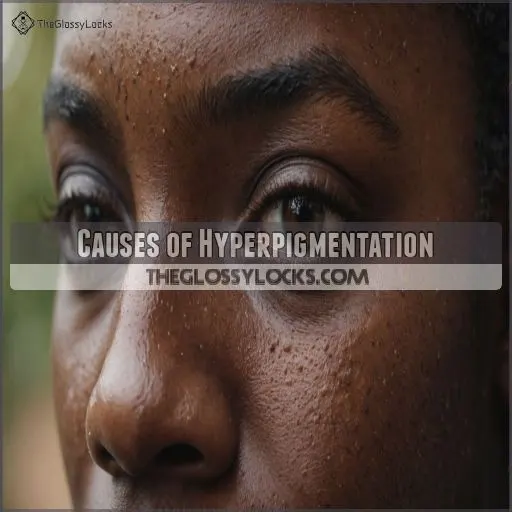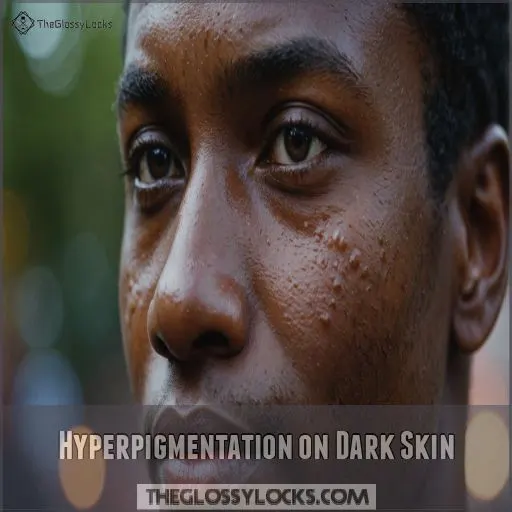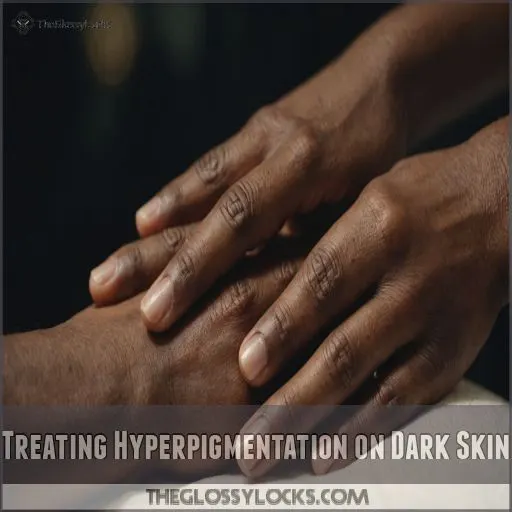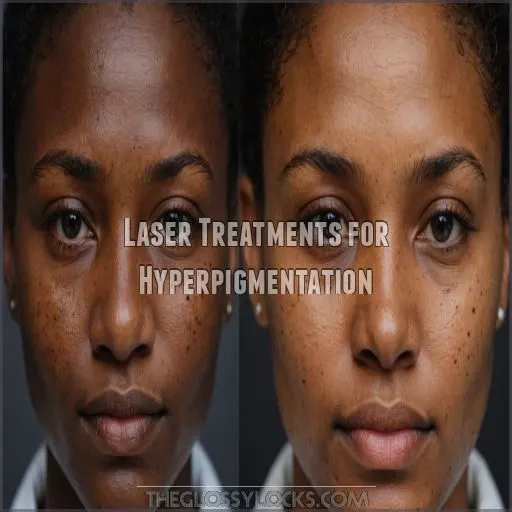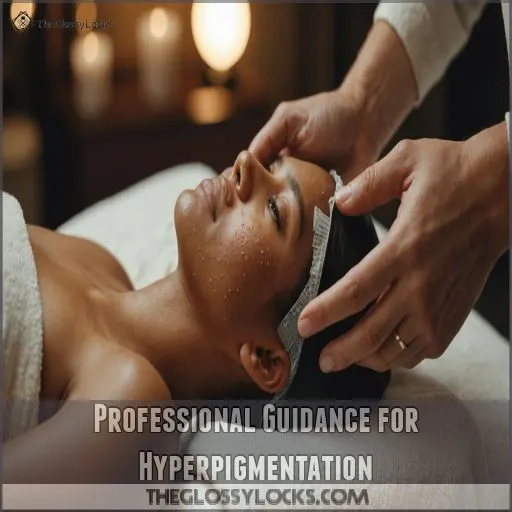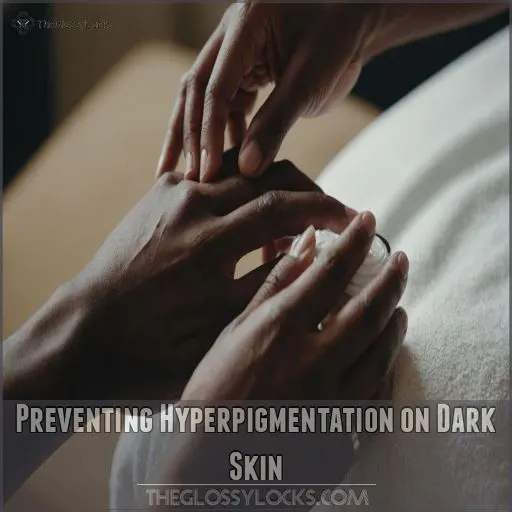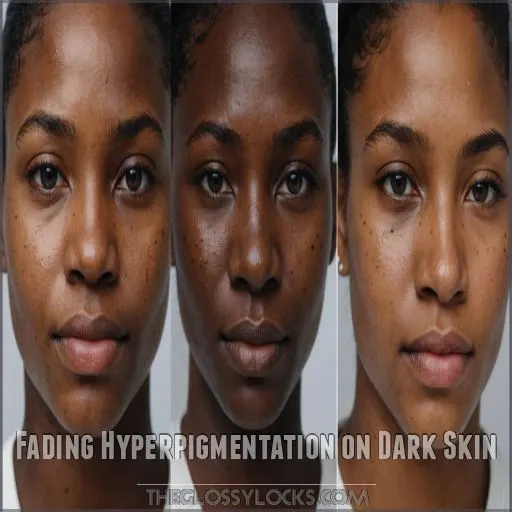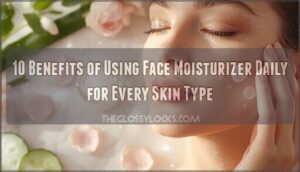This site is supported by our readers. We may earn a commission, at no cost to you, if you purchase through links.
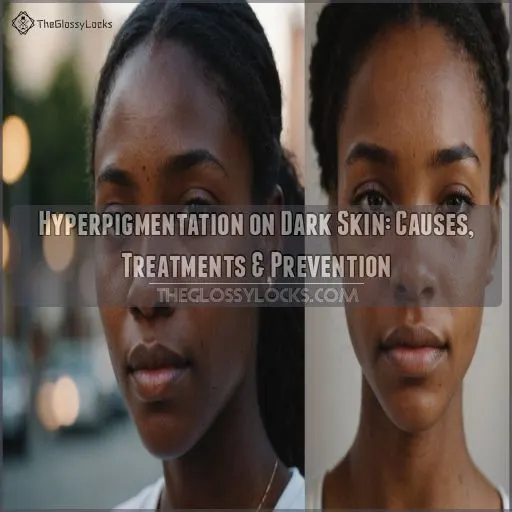
Start with gentle chemical peels using glycolic acid and consider laser treatments that are safe for rich skin tones.
Topical goodies like vitamin C and retinoids are your friends too. And sunscreen? It’s your best buddy—apply it every day to fend off more spots.
Consult a dermatologist who really gets dark skin nuances to avoid mishaps. The journey to even skin takes time and patience, but you’ll get there.
Ready for more tips on achieving that glow?
Table Of Contents
- Key Takeaways
- Causes of Hyperpigmentation
- Hyperpigmentation on Dark Skin
- Treating Hyperpigmentation on Dark Skin
- Laser Treatments for Hyperpigmentation
- Professional Guidance for Hyperpigmentation
- Preventing Hyperpigmentation on Dark Skin
- Fading Hyperpigmentation on Dark Skin
- Frequently Asked Questions (FAQs)
- How do dermatologists treat hyperpigmentation & dark spots?
- What is the treatment for pigmentation on skin?
- Can hyperpigmentation be treated?
- How to lighten hyperpigmentation on black skin?
- How do you get rid of hyperpigmentation on dark skin?
- How can I lighten my hyperpigmentation fast?
- How do dermatologists remove hyperpigmentation?
- What is the best professional treatment for hyperpigmentation?
- What over-the-counter creams help with hyperpigmentation?
- Can home remedies fade dark spots effectively?
- How does diet impact skin pigmentation changes?
- Are there makeup tips to cover hyperpigmentation?
- Do face masks reduce the appearance of dark spots?
- Conclusion
Key Takeaways
- You’re not alone in the battle against hyperpigmentation on dark skin. Try combining gentle chemical peels, laser treatments, and topical treatments like vitamin C and retinoids, while making sunscreen your daily best buddy.
- Watch out for triggers like inflammation, sun, hormones, and pollution. Tackling these triggers is like squashing a pesky bug—annoying but necessary. A good dermatologist who understands dark skin nuances can steer you clear of mishaps.
- Stick to treatments crafted for melanin-rich skin, such as microneedling and laser therapy, and be cautious with chemical peels. These methods, such as using lemon juice treatments, can safely lighten your skin tone if done correctly
.
- Prevention is worth a pound of cure, or a tube of sunscreen in this case. Avoid picking pimples, adopt a healthy lifestyle, and reduce stress to help prevent hyperpigmentation from rearing its stubborn head.
Causes of Hyperpigmentation
You might find yourself wondering why those pesky dark spots just won’t quit, and trust me, you’re not alone.
Hyperpigmentation can be triggered by a variety of factors.
These factors include skin inflammation, hormonal shifts, too much sun, genetics, and even pollution, making it as complicated as a soap opera plot.
Skin Inflammation and Hyperpigmentation
Blame inflammation for those pesky dark spots on your skin. When acne or a bug bite trigger inflammation, your skin often overreacts, leading to post-inflammatory hyperpigmentation.
You’re in control, though! Here’s what to do:
- Keep acne in check.
- Use gentle skincare products like those recommended for lupus skin
.
- Opt for topical medications.
- Prevent with sunscreen.
Remember, patience is your best friend!
Hormonal Changes and Hyperpigmentation
Imagine your skin doing the tango with hormones—pregnancy, birth control, menopause, thyroid troubles, and stress can all lead to hyperpigmentation.
These hormonal fluctuations may cause skin discoloration, especially in Fitzpatrick skin types.
Embrace treatments like chemical peels designed for dark skin, giving you greater control over your skin’s narrative and less room for unwelcome surprises, allowing you to take control of your skin’s narrative.
Sun Damage and Hyperpigmentation
You’ve got to watch out for sun damage because it can sneak up and cause hyperpigmentation, especially on dark skin.
Use a solid UV protection routine to fend off those pesky dark spots:
- Regularly apply broad-spectrum sunscreen.
- Wear protective clothing and wide-brimmed hats.
- Seek shade during peak sun hours.
Stay sun-savvy and keep that skin tone glowing!
Genetics and Hyperpigmentation
Some families hit the genetic jackpot with beautiful, rich skin tones, but a predisposition for hyperpigmentation can also join the party.
Your genes dictate how much melanin you produce, leading to variations in skin tone. This genetic predisposition means if your relatives have hyperpigmentation, you might too.
While embracing your skin’s unique traits, explore treatments like skin lightening or laser therapy for balance.
Pollution and Hyperpigmentation
Genetics might play a role in how your skin reacts, but environmental factors like pollution amp up the drama.
Pollution’s impact on melanin production can lead to hyperpigmentation, especially on dark skin.
Air pollution effects can make dark spots appear darker.
Embrace your skin’s freedom with protective antioxidants like vitamin C or exfoliants such as glycolic and salicylic acids.
Hyperpigmentation on Dark Skin
If you’ve got dark skin, you know hyperpigmentation can be a real pain.
But don’t worry, we’ve got your back.
From melasma to sun spots, we’ll explore the causes and share the best ways to tackle those pesky dark patches.
Melasma and Dark Skin
Imagine your hormones throwing a party, and melasma barging in as the unwanted guest, causing dark patches on your skin.
It’s often linked with pregnancy, estrogen, and sunlight.
Feeling frustrated? You’re not alone.
Explore melasma treatment options like chemical peels and laser therapy.
Don’t forget your sunburn prevention tips and sunscreen as top prevention tips
!
Sun Spots and Dark Skin
Sun spots on dark skin can be as stubborn as a cat ignoring its name. They’re caused by sun exposure, creating clumps of melanin.
Protect your skin with sunscreen—every single day! Prevention is key, similar to keeping cookies away from a sneaky dog.
Treatments like q-switched and nonablative lasers help lighten these spots post-exposure.
Post-Inflammatory Hyperpigmentation (PIH) on Dark Skin
If you’ve struggled with acne, injuries, or infections, you might be familiar with post-inflammatory hyperpigmentation (PIH) – a common condition where dark spots linger after the initial issue has healed.
- PIH is more common and severe in darker-skinned individuals (Fitzpatrick skin types III-VI)
- It can be triggered by inflammatory skin conditions, infections, allergic reactions, and injuries
- Treatment options include topical lightening agents, chemical peels, and laser therapy
- Combination therapy is often more effective than monotherapy
- Prevention is key – use broad-spectrum sunscreen and protective clothing daily to prevent further darkening of PIH
Susceptible Body Parts for Hyperpigmentation on Dark Skin
When it comes to hyperpigmentation on dark skin, some body parts are more prone than others. Your face, neck, arms, knees, and legs often face the music. They can develop liver spots, senile lentigines, and cafe-au-lait marks.
To help you visualize, here’s a handy table:
| Body Part | Common Issue |
|---|---|
| Face | Age spots |
| Arms | Liver spots |
| Legs | Cafe-au-lait marks |
Consider intense pulsed light treatments or sunscreen for prevention.
Treating Hyperpigmentation on Dark Skin
When you’re struggling with dark spots on your skin, it can feel like you’re fighting an uphill battle with unruly melanin.
Don’t worry, though; from chemical peels to laser therapies, there are plenty of effective treatments that can help you regain your skin’s even appearance.
Chemical Peels for Hyperpigmentation on Dark Skin
Explore chemical peels cautiously if you have dark skin – they can sometimes worsen hyperpigmentation. Opt for gentler alpha-hydroxy acids like glycolic or mandelic acid, which penetrate more slowly. Avoid deep peels, which pose a higher risk.
Work with an experienced dermatologist who understands melanin-rich skin to find the right peel for your skin.
Dermatology and people of color is an area that requires attention. Many dermatological procedures seem to cause problems for people with dark skin. One of the biggest reasons is that many dermatologists and estheticians aren’t trained to treat dark skin.
Melanin-rich skin responds differently to temperature and chemical formulations than a fair skin tone (like Type I) would, similar to how skin tones undertones impact ideal hair color matches optimal hair shade finder
. Peels that penetrate the skin too deeply can produce heat that damages the melanocyte in Type V and VI skin, which can either remove the color from the skin or cause erythema that can lead to post-inflammatory hyperpigmentation like dark marks and scarring.
Microneedling for Hyperpigmentation on Dark Skin
Chemical peels might be eyebrow-raisers, but microneedling takes the cake for improving dark skin hyperpigmentation.
It boosts collagen, minimizing dark spots’ appearance safely—even for home use. Just watch for microneedling risks like infection.
Consider investing in professional sessions for best microneedling results with experts who use platelet-rich plasma. Complement with aloe vera, licorice extract, or azelaic acid for stellar skin.
Laser Treatments for Hyperpigmentation on Dark Skin
If microneedling has you intrigued, think of lasers as another powerful option for hyperpigmentation.
Laser treatments can effectively target dark spots on dark skin, but it’s not without risks.
You’ll need to weigh different laser types, potential side effects, and costs. Always consult a dermatologist to make sure long-term, safe results and keep those pesky spots at bay.
Laser Treatments for Hyperpigmentation
Laser treatments for hyperpigmentation might sound like something from a sci-fi movie, but they’re real and worth considering if you’re battling stubborn dark spots.
With options like ablative and nonablative lasers, along with IPL treatments, you’ve got some solid tools to help even out your skin tone.
Ablative Resurfacing Lasers for Hyperpigmentation
Considering laser treatments for hyperpigmentation on dark skin? Ablative resurfacing lasers might promise impressive results, but they come with risks like scarring and longer recovery times.
Costs can vary, so it’s wise to compare options.
Make sure you’re a good candidate by consulting a professional familiar with diverse skin tones.
Remember, not all lasers—like pulsed lasers—are suitable for everyone, and it’s essential to find the right one to minimize risks like scarring .
Nonablative Resurfacing Lasers for Hyperpigmentation
Understanding nonablative resurfacing lasers might feel like a tightrope walk, but these lasers provide effective results for hyperpigmentation on dark skin. They offer minimal downtime and keep your skin intact, ensuring laser safety and cost-effectiveness ,.
Pair treatments with topicals like ellagic acid or green tea extract for enhanced results.
Consult a pro from the American Society of Plastic Surgeons.
IPL Treatments for Hyperpigmentation
IPL treatments are a mixed bag for dark skin. They can help reduce hyperpigmentation, like melasma, but risks lurk.
Always check your wallet; costs vary. The battle of IPL vs. laser depends on skin type and goals.
Think of IPL maintenance as a skincare subscription. Keep your dermatologist in the loop to steer clear of setbacks.
At-home Laser Treatments for Hyperpigmentation
Wondering if at-home laser devices can actually treat your stubborn hyperpigmentation?
Unfortunately, most over-the-counter laser gadgets are far too weak to make a noticeable difference. To effectively fade dark spots, you’ll need a professional-grade laser treatment from an experienced dermatologist.
But don’t worry – they can create a customized plan to safely and effectively improve your skin tone.
Professional Guidance for Hyperpigmentation
If you’re struggling with stubborn hyperpigmentation, finding a board-certified dermatologist who knows their stuff can be a game-changer.
You’ll get a personalized plan with safe treatment options that fit your skin’s unique needs.
Even if it means skipping a few lattes to cover the costs, visiting a dermatologist can be worth it for effective treatment, making it a game-changer.
Choosing a Dermatologist for Hyperpigmentation
When picking a dermatologist, dive deep into their experience with dark skin hyperpigmentation, ensuring they’ve got the skin tone expertise you need.
Consider the treatment options they suggest, keeping an eye on cost considerations.
Check out reviews and testimonials, as they can offer real insight—and maybe a chuckle or two. After all, glowing skin shouldn’t mean soaring stress levels. (Source).
What to Expect From a Dermatologist for Hyperpigmentation
You’ve picked a dermatologist, right? Great choice!
Next, expect an expert’s touch to evaluate your skin and discuss treatment options made just for you.
They’ll craft a personalized plan, considering costs and building an easy skincare routine.
Regular check-ins make sure everything’s on track. It’s like having a skin coach for your journey!
Treatment Options for Hyperpigmentation From a Dermatologist
For treating hyperpigmentation on dark skin, dermatologists suggest a mixed bag of options.
Consider these:
- Chemical peels: Gradually brighten your skin using gentle acids.
- Laser therapy: Safe, non-ablative lasers can work wonders.
- Topical treatments: Prescribed creams lighten spots over time.
- Microneedling: Stimulate collagen for even skin tone.
- Sunscreen: Always a must to prevent worsening!
Cost of Professional Treatments for Hyperpigmentation
Exploring treatment options with your dermatologist could lead you to discuss costs.
Considering professional treatments, such as chemical peels and laser therapies, it’s like choosing between a gourmet meal or a quick snack—each with its price.
Treatment cost comparison helps find budget-friendly options, while insurance and financing options balance cost vs. effectiveness for your unique needs.
Preventing Hyperpigmentation on Dark Skin
You don’t want those pesky dark spots sticking around, so start with sunscreen to shield your skin from sun damage and ward off hyperpigmentation.
Also, try to resist the urge to pick at any pimples—it’s as hard as avoiding your favorite dessert, but your skin will thank you for resisting the temptation to pick at pimples.
Sunscreen for Preventing Hyperpigmentation on Dark Skin
Sunscreen is your skin’s best friend for preventing hyperpigmentation on dark complexions.
Look for formulas with mineral blockers like zinc oxide or titanium dioxide, which shield against both UVA and UVB rays.
Apply it daily, rain or shine, to keep those pesky dark spots at bay. Your skin will thank you for using mineral blockers!
Avoiding Picking at Pimples for Preventing Hyperpigmentation
Slathering on sunscreen helps, but what about those tempting pimples? Avoiding pimple picking can prevent the dark spots you dread on your beautiful dark skin.
Here’s why you should leave them be:
- Skin Picking Habits: Banish them to avoid scars. Skin picking can lead to inflammation, which in turn can cause dark spots on black skin, similar to those caused by sun exposure, hormonal changes, or acne. Understanding the causes of dark spots, such as hyperpigmentation from inflammation, is important for choosing the right treatment.
- Anxiety & Picking: Address triggers calmly.
- Picking Prevention Tips: Keep hands busy with fun!
Minimizing Inflammation for Preventing Hyperpigmentation
You’ve already nailed the "no picking" part, so let’s keep inflammation in check too.
Embrace an anti-inflammatory diet filled with colorful veggies and omega-rich foods.
A consistent skincare routine with gentle products can also work wonders.
Consider topical treatments like niacinamide.
Toss in some lifestyle changes, and you’re on track to prevent those pesky dark spots.
Reducing Stress for Preventing Hyperpigmentation
Everyone feels stress, but managing it can help prevent hyperpigmentation on dark skin.
Embrace these strategies:
- Mindfulness practices like meditation calm your mind.
- Relaxation methods such as yoga ease tension.
- Identify stress triggers to avoid them.
- Utilize effective coping strategies such as talking it out with friends.
You’ll find these techniques bring peace and clarity.
Fading Hyperpigmentation on Dark Skin
You’ve probably noticed that those stubborn dark spots seem to hang around forever on dark skin, but don’t lose hope just yet.
With patience, the right ingredients, and a bit of humor (because laughter is good medicine too), you can start fading hyperpigmentation and feel more like yourself again.
Timeframe for Fading Hyperpigmentation on Dark Skin
Fading hyperpigmentation on dark skin is like watching grass grow—it takes time and patience.
Individual factors and treatment options vary its evolution. Typically, expect noticeable fading in three to six months, although severe cases might linger longer.
Set realistic expectations, embrace the journey, and remember, patience is key. Thankfully, progress fosters hope and brighter days ahead.
Effective Ingredients for Fading Hyperpigmentation on Dark Skin
What’s the secret to fading those stubborn dark spots?
Look for ingredients like hydroquinone, retinoids, and vitamin C – they’re powerhouses for evening out your skin tone.
Azelaic acid and niacinamide can also work wonders, reducing inflammation and inhibiting excess melanin production.
With a little patience and consistency, you’ll be glowing in no time!
Treatment Options for Fading
You’ve got options for fading hyperpigmentation on dark skin.
Start with home remedies like aloe vera or turmeric for gentle care.
Topical treatments such as hydroquinone can brighten things up.
Professional treatments, including chemical peels or laser therapy, might suit you if you’re game for expert help.
Stick to a skincare routine for lasting results and peace of mind (Source).
Frequently Asked Questions (FAQs)
How do dermatologists treat hyperpigmentation & dark spots?
Dermatologists often tackle hyperpigmentation and dark spots with a mix of topical treatments like hydroquinone and tretinoin, chemical peels, and targeted laser therapy.
For darker skin, treatments are carefully chosen to avoid further discoloration.
What is the treatment for pigmentation on skin?
Think of pigmentation treatment like peeling away layers of an onion.
You can try topical creams, chemical peels, or laser therapy to lighten dark spots, using treatments like skin hyperpigmentation management
.
Consistent sun protection is key to prevent recurrence and maintain results.
Can hyperpigmentation be treated?
Absolutely, hyperpigmentation can be treated!
Start with over-the-counter hydroquinone creams, then level up to prescription-strength combos or professional treatments like chemical peels and laser therapy.
Just be patient – it may take some trial and error to find what works best for your skin.
How to lighten hyperpigmentation on black skin?
When you tackle hyperpigmentation on black skin, think of it as painting your canvas with patience.
Try gentle chemical peels like salicylic acid, use daily sunscreen, and consult pros for laser treatments designed for dark skin (Source).
How do you get rid of hyperpigmentation on dark skin?
To tackle hyperpigmentation on dark skin, try using sunscreen daily and gentle exfoliants like mandelic acid.
If needed, consult a dermatologist for treatments like chemical peels or non-ablative lasers, specifically designed for darker skin tones.
How can I lighten my hyperpigmentation fast?
Try using glycolic or kojic acid creams, adding sunscreen daily, and consulting a dermatologist.
Remember, Rome wasn’t built in a day—results take time. Patience and consistency will be your best friends here.
How do dermatologists remove hyperpigmentation?
Doctors remove hyperpigmentation using lasers, chemical peels, and topical treatments like retinoids or hydroquinone.
Each choice depends on your skin type and needs.
Always chat with your dermatologist to find what works best for you.
What is the best professional treatment for hyperpigmentation?
Unearthing the holy grail of hyperpigmentation treatments, lasers like Fraxel and chemical peels work wonders.
But remember, it’s key to consult a pro who knows your skin tone to avoid turning a party into a disaster.
What over-the-counter creams help with hyperpigmentation?
Look for over-the-counter creams featuring vitamin C, glycolic acid, or niacinamide to tackle hyperpigmentation.
These ingredients can brighten your skin tone and reduce dark spots over time, with the help of natural skin brighteners like turmeric and apple cider vinegar, found in natural skin remedies
.
Consistency is key; progress may take several months, requiring consistency.
Can home remedies fade dark spots effectively?
Harness the power of nature’s bounty – apple cider vinegar, aloe vera, and red onion – to fade those pesky dark spots.
With a little TLC, you can reclaim your radiant glow.
How does diet impact skin pigmentation changes?
Eating more fruits and veggies can shift your skin’s hue thanks to carotenoids, giving it a healthy glow.
Think of it like nature’s own subtle tanning without the sunburn risk—a little goes a long way!
Are there makeup tips to cover hyperpigmentation?
Start with a good skincare routine and a hydrating primer.
Color-correct with orange or peach tones before applying foundation.
Use a buildable foundation, set it with powder, and focus on enhancing your favorite features for a confidence boost.
Do face masks reduce the appearance of dark spots?
Face masks can indeed help reduce dark spots by using ingredients like Vitamin C, turmeric, and aloe vera to fade discoloration and brighten your complexion.
They’re convenient and effective, just like a mini spa at home.
They are referenced in.
Conclusion
Who knew a little extra pigment could be so stubborn?
Dealing with hyperpigmentation treatment for dark skin can feel like deciphering a complex puzzle, but you’re equipped. Remember, steady use of sunscreen and patience are your allies.
Embrace those glycolic peels, lasers, and trusty vitamin C as your skin squad. Consulting a dermatologist that understands your skin’s uniqueness can guide you the right way.
Stay persistent, and soon, you’ll see those pesky spots fade into the background.

